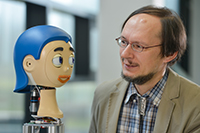Feb 13 2015
Equipping machines with the necessary intelligence that will enable them to recognize how to make life easier for their human users all by themselves: To further this research, Bielefeld University is strengthening its international ties with leading universities and research institutes on five continents.
 The new network creates attractive training options for young academics,’ says Prof. Dr. Helge Ritter from the CITEC Cluster of Excellence. The network will be focusing on intelligent systems such as the robot head Flobi. Photo: CITEC/Bielefeld University
The new network creates attractive training options for young academics,’ says Prof. Dr. Helge Ritter from the CITEC Cluster of Excellence. The network will be focusing on intelligent systems such as the robot head Flobi. Photo: CITEC/Bielefeld University
The German Academic Exchange Service (DAAD) is providing more than 800,000 Euro for the new Thematic Network: Interactive Intelligent Systems. Bielefeld University’s Cluster of Excellence Cognitive Information Technology (CITEC) will be running the programme. Bielefeld already has one Thematic Network in the theoretical sciences set up in 2013. The DAAD is funding a total of 28 Thematic Networks throughout Germany.
‘Funding approval for the new Thematic Network shows that making technical systems intelligent and helpful is a very promising approach,’ says the CITEC coordinator Professor Dr. Helge Ritter. ‘Thanks to this network, we can not only create an exceptional international platform for cooperation and research in our field but also further expand what is already a very attractive environment to recruit outstanding young people for high tech and technology-related professions and provide them with top-level training,’ says Ritter. ‘This makes a major contribution to ensuring our competitiveness and makes us better able to apply human-oriented technology to handle the future challenges facing society.’
Alongside Bielefeld University, other members of the thematic network are the Indiana University Bloomington (USA), Osaka University (Japan), the Queensland University of Technology (Australia), the Technion – Israel Institute of Technology (Israel), and the Italian Institute of Technology (Italy). From April 2015 to March 2018, researchers from these universities and research institutes will be coming to Bielefeld as guests. In addition, CITEC researchers will be travelling to the network partners to work on projects there. ‘Switching labs gives researchers an opportunity to work with different prototypes from the ones at their own institutes. Moreover, the close cooperation with colleagues on site provides a hotbed of ideas for future joint projects,’ says Helge Ritter. Part of the Thematic Network programme is to hold annual Workshops at one of the partner institutes. A Summer School, also organized annually, will bring together doctoral students from all six participating organizations to discuss how their work is progressing. The programme will be flanked by student exchanges between the institutes.
The Thematic Network coordinated by CITEC had to pass through a highly competitive selection procedure. Out of a grand total of 89 applications, only 28 projects throughout Germany are receiving funding for the second round of the DAAD competition. Bielefeld is one of only three universities in Germany to succeed in gaining two Thematic Networks in the two rounds so far. The Thematic Network ‘From Extreme Matter to Financial Markets’ has been funded at Bielefeld University since 2013. The other two universities with two thematic networks are the Technische Universität München and the University of Hohenheim.
Since 2007, Bielefeld University’s Strategic Research Area Interactive Intelligent Systems (IIS) has been studying how to equip robots and other technical systems with artificial intelligence to make them more useful and helpful. Robots and domestic appliances should be so easy to instruct that even lay persons can do it intuitively and systems should acquire new knowledge and skills through learning while they are operating. The new Thematic Network gains its name from the Strategic Research Area. Intelligent technical systems are being studied and developed in Bielefeld University’s Cluster of Excellence Cognitive Information Technology (CITEC) in close cooperation with the university’s Research Institute for Cognition and Robotics (CoR-Lab) that specializes in new technologies and industrial applications.